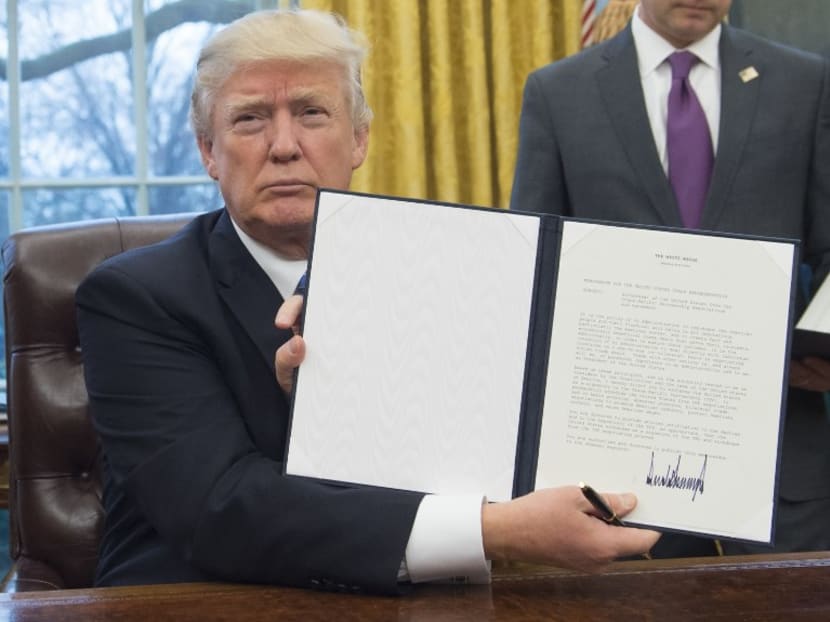Doubt over America’s leadership in Asia Pacific as Trump exits TPP
WASHINGTON — President Donald Trump’s formal withdrawal of the United States on Monday (Jan 23) from the ambitious, 12-nation Trans-Pacific Partnership (TPP) could be geostrategically damaging for America as it would not only send a signal of disengagement from the Asia-Pacific, but also cast doubts about its leadership position in the region. At the same time, this creates a political and economic vacuum that China is eager to fill.

United States President Donald Trump holding up the executive order withdrawing the US from the Trans-Pacific Partnership. Photo: AFP
WASHINGTON — President Donald Trump’s formal withdrawal of the United States on Monday (Jan 23) from the ambitious, 12-nation Trans-Pacific Partnership (TPP) could be geostrategically damaging for America as it would not only send a signal of disengagement from the Asia-Pacific, but also cast doubts about its leadership position in the region. At the same time, this creates a political and economic vacuum that China is eager to fill.
The TPP deal, which was to link a dozen nations in the Asia-Pacific in a complex web of trade rules, was sold as a way to permanently tie the US to East Asia and create an economic bulwark against a rising China.
While China has grown in clout, it has also unnerved neighbours with its military modernisation and its behaviour over disputed areas of the East and South China Seas. The TPP was seen as a way to further bind countries, including smaller South-east Asian nations, to the US – and act as a buffer.
However, with American involvement in the pact all but over, former US President Barack Obama’s so-called pivot to Asia and concomitantly America’s credibility and leadership in the region could be undermined.
Republican Senator John McCain called the decision to withdraw from the TPP “a serious mistake” that would hurt the superpower. “It will send a troubling signal of American disengagement in the Asia-Pacific region at a time we can least afford it,” he said in a statement.
Associate Professor Victor Shih, a political economy expert at the University of California in San Diego, said withdrawing from the TPP would alter America’s image in the region.
“The US will be seen as an unreliable partner both economically and perhaps even in the security arena,” he told The New York Times.
Other than trade, Asian leaders are stung after investing political capital in the deal. Mr Trump’s decision is particularly crushing for Japan, where Prime Minister Shinzo Abe spent considerable political capital to get the agreement through Parliament, which ratified it on Friday (Jan 20). And just hours before Mr Trump dispensed with the TPP, Mr Abe told parliament that Tokyo would lobby the new administration on the merits of the deal.
Mr Trump opposed the TPP because he said it could hurt American jobs. But the impact of his decision is likely to go beyond trade, giving more leeway to Chinese President Xi Jinping to position China as an economic and military anchor in the western Pacific.
Since coming to power, Mr Xi has sought to expand China’s trade ties with its neighbours and begun an ambitious infrastructure project designed to reinvigorate ancient trading routes to the Middle East and Europe.
“There’s no doubt that (the US withdrawal from the TPP) will be seen as a huge, huge win for China,” Mr Michael Froman, the former trade representative who negotiated the pact for Mr Obama, told The New York Times.
“For the Trump administration, after all this talk about being tough on China, for their first action to basically hand the keys to China and say we’re withdrawing from our leadership position in this region is geostrategically damaging.”
Ms Angela Poh, a China researcher from the S Rajaratnam School of International Studies, told TODAY that Mr Trump’s ditching of the TPP would thus prompt nations to consider alternatives such as the Regional Comprehensive Economic Partnership (RCEP) and the Free Trade Agreement of the Asia-Pacific, both of which are either China-led or heavily backed by China.
Analysts also say the world could drift into an era of confrontation and great power politics more familiar to the 19th century than the past few decades of American supremacy.
“Eventual Chinese leadership (in the region) would not be akin to America assuming Britain’s former role after World War II,” wrote Mr Richard Fontaine, a former Bush administration official, in the Wall Street Journal.
“Instead it would lead to a world likely less prosperous and certainly less free.”
But even if the TPP is truly finished, it may not be smooth sailing for China trying to assume the leadership mantle in Asia.
Beijing could find challenges rallying its neighbours, according to Barry Naughton, a professor of Chinese economy at the University of California in San Diego.
“They (China) are not in position to take their own interests and merge that with a set of global interests and make the kind of sacrifices necessary to bring allies closer to them,” he said on Bloomberg Television.
Dr Chong Ja Ian of the National University of Singapore, who specialises in Asia-Pacific relations, said the situation is "complicated".
“There will be certain countries that are far more comfortable with China, but there will also be others that remain more comfortable with the United States despite the change in direction under Trump... There will also be other nations that may seek alternative approaches that emphasise more distance from both Beijing and Washington.”
AGENCIES WITH ADDITIONAL REPORTING BY BEN HO






